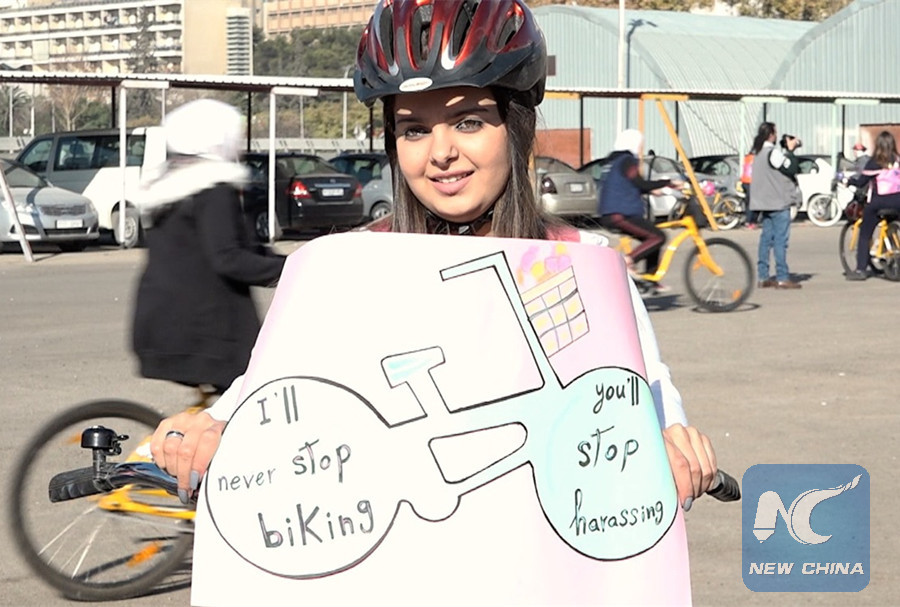
"I will never stop biking; you will stop harassing," with this banner, around 300 Syrian women hold a bike marathon in the capital Damascus on Dec. 1, 2017, as a way to protest against the harassment they suffer from when they ride bicycles. (Xinhua/Monsef Memari)
DAMASCUS, Dec. 1 (Xinhua) -- "I will never stop biking; you will stop harassing," with this banner, around 300 Syrian women held a bike marathon in the capital Damascus on Friday as a way to protest against the harassment they say they suffer from when they ride bicycles.
"Let's make a difference," another banner read as the women set off from the President's Bridge toward the Umayyad Square in the heart of Damascus.
While it could be normal elsewhere, but the scene of a woman riding a bicycle in Syria is still uncommon despite the fact that women here enjoy similar rights of the men in terms of job opportunities and high-profile government posts.
Still, women in Syria look at the community as a macho society, and when riding a bike, they become the target of the men's eyes, many of whom don't just watch but try to either make fun of them or make inappropriate sexual comments.
Filling their tires and wearing their helmets, the young women looked determined to deliver their message at a time when the bicycles have become more common in Damascus with the heavy and suffocating traffic in the capital.
"We are here for the women marathon and to give a message that we will not allow anyone to either harass or badmouth us because we can ride bicycles and we have no problem with that," Rahaf, a 25-year-old university student, told Xinhua.
Her friend, Heba, a 24-year-old university student, said she wanted to deliver a message that women can ride bikes as men and that the stereotypical picture of the women must change.
"I came here to encourage fellow women to ride bicycles and to prove that I can ride a bicycle on the street just like anyone else," she told Xinhua.
Women wearing headscarves, locally known as Hijab, also took part in the activity, saying the community's perspective about women in hijab must change as well.
"If they (men) saw an unveiled woman riding a bike they would verbally harass her, but if they saw a woman wearing hijab riding the bike they would look in a strange way and I want to say that we have the right of equality and our religious duties are our own business," Maha, a 30-year-old accountant, said.
The marathon was organized by a local initiative called "Yalla Let's Bike" or "come on let's bike," which encourages people to ride bicycles.
This time, the initiative called for halting the verbal harassment of women who ride bikes whether to their universities, jobs or anywhere else.
Syrian artists also took part in the bike rally, which included a painting activity.
The activity itself and the message of the women are important, as they not only reflect the women's disapproval of the society's look at those who ride bikes, but also reflect another truth in the course of the Syrian crisis.
It's the fact that the decreasing intensity of violence in Damascus has pushed the residents back to their normal mindset of caring more about other problems than war and violence.
Although mortar shells from the rebels sometimes bring the people to the harsh reality that the war hasn't ended yet, the rate of violence has decreased notably as the Syrian army and its allies have made a breakthrough in the battle against the terror-designated groups of the al-Qaida-linked Nusra Front as well as the Islamic State (IS), which has lost its major strongholds in Syria.
Now, the people here in Damascus complain about traffic jams, the high prices and other life issues, but they no longer concentrate on the course of the war amid a wide belief that the war is nearing an end due to the apparent international consensus on the need to end it.

